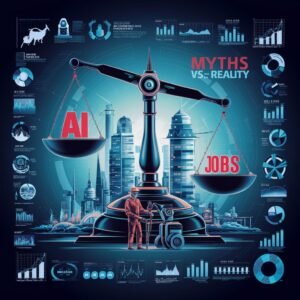Artificial Intelligence (AI) is a buzzword that has captured the imagination of many, yet its concepts can be complex and intimidating for beginners. In this beginner’s guide, we will break down the fundamental concepts of AI, explore its various subfields, and explain why it is such a transformative technology.
What is Artificial Intelligence?
At its core, Artificial Intelligence refers to the development of computer systems that can perform tasks that typically require human intelligence. These tasks encompass various activities like problem-solving, learning, understanding natural language, recognizing patterns, and making decisions. AI systems aim to mimic human cognitive functions to perform these tasks efficiently and sometimes even surpass human capabilities.
Key Concepts in Artificial Intelligence
To understand AI, you need to be familiar with some fundamental concepts and subfields:
1. Machine Learning (ML)
Machine Learning is a subset of AI that focuses on creating algorithms and models that enable computers to learn from and make predictions or decisions based on data. ML includes supervised learning, unsupervised learning, and reinforcement learning, which are used for various applications, from image recognition to natural language processing.
2. Deep Learning
Deep Learning is a specialized area within machine learning that uses neural networks, which are inspired by the structure of the human brain. Deep learning models have achieved remarkable success in image and speech recognition, natural language understanding, and many other applications.
3. Natural Language Processing (NLP)
Natural Language Processing is a subfield of AI that deals with the interaction between computers and human language. NLP allows computers to understand, interpret, and generate human language, enabling applications like chatbots, language translation, and sentiment analysis.
4. Computer Vision
Computer Vision focuses on enabling machines to interpret and understand visual information from the world, often using image and video data. It finds applications in facial recognition, object detection, autonomous vehicles, and medical image analysis.
5. Robotics
Robotics is an interdisciplinary field that combines AI, engineering, and mechatronics to create robots capable of performing tasks autonomously or semi-autonomously. Robots find applications in manufacturing, healthcare, and even space exploration.
6. Expert Systems
Expert Systems are AI programs designed to mimic the decision-making abilities of a human expert in a particular field. These systems are used in applications like medical diagnosis and financial planning.
Why Artificial Intelligence Matters
Artificial Intelligence is a game-changer in various industries, and its significance is growing exponentially. Here are some key reasons why AI matters:
- Automation: AI enables the automation of repetitive and time-consuming tasks, increasing productivity and reducing human error.
- Efficiency: AI systems can process and analyze vast amounts of data quickly and accurately, providing insights and predictions that would be impossible for humans to achieve.
- Personalization: AI powers recommendation systems that personalize user experiences, from e-commerce product recommendations to content suggestions on streaming platforms.
- Healthcare: AI is used for medical diagnosis, drug discovery, and patient monitoring, improving healthcare outcomes.
- Autonomous Systems: AI is essential for autonomous vehicles, drones, and industrial robots, which have the potential to revolutionize transportation and manufacturing.
- Language Translation: NLP and AI have made tremendous strides in language translation, breaking down language barriers in global communication.
- Scientific Research: AI accelerates scientific research by analyzing complex data sets and simulating experiments.
- Predictive Maintenance: AI can predict equipment failures in industrial settings, reducing downtime and maintenance costs.
How to Get Started with Artificial Intelligence
If you’re interested in exploring the world of AI, here are some steps to get started:
- Learn the Basics: Start with online courses, books, and tutorials that introduce you to AI and its key concepts. Platforms like Coursera, edX, and Udacity offer comprehensive AI courses.
- Programming Skills: Develop strong programming skills, particularly in languages like Python, which is widely used in AI development.
- Mathematics: Brush up on your mathematics, especially linear algebra, calculus, and probability, which form the foundation of AI and machine learning.
- Practice: Hands-on experience is crucial. Start with small AI projects or datasets to gain practical knowledge.
- AI Frameworks and Libraries: Familiarize yourself with popular AI frameworks and libraries, such as TensorFlow, PyTorch, and scikit-learn.
- Online Communities: Join AI-related communities on platforms like GitHub, Stack Overflow, and Reddit to connect with other learners and professionals.
- Consider a Specialization: AI has many subfields, so consider specializing in an area that aligns with your interests and career goals.
- Certifications: Earning AI certifications can validate your knowledge and skills, making you more competitive in the job market.
AI is a vast field with endless possibilities, making it an exciting journey for those who embark on it. As you learn more about AI, you’ll discover that it plays a pivotal role in shaping the future of technology, science, and many aspects of our daily lives. Here are a few ways to stay motivated and engaged as you continue your AI journey:
- Stay Informed: AI is a rapidly evolving field. Stay up to date with the latest trends, breakthroughs, and research papers to understand the direction in which AI is heading.
- Join AI Projects: Collaborating on AI projects, either independently or as part of a team, will provide valuable hands-on experience and a sense of accomplishment.
- Open Source Contributions: Consider contributing to open source AI projects. This not only helps the community but also allows you to work with experienced developers.
- Blogs and News: Read AI-related blogs and news articles to gain insights into real-world AI applications and developments.
- Meetups and Conferences: Attend AI meetups and conferences to network with like-minded individuals and professionals in the field. These events often feature workshops and presentations from industry experts.
- Mentorship: Seek out mentors in the field who can provide guidance and valuable insights as you progress in your AI journey.
Remember that learning AI is a gradual process, and it’s okay to start small. As you gain experience and knowledge, you can take on more complex projects and explore specialized areas of AI.
Conclusion
Artificial Intelligence is no longer science fiction; it’s a transformative technology that has found its way into various industries and our daily lives. This beginner’s guide aims to demystify AI by explaining its fundamental concepts, subfields, and its profound impact on the world.
As you embark on your AI journey, embrace the excitement and endless possibilities that AI offers. Whether you are a student, a developer, or someone curious about the future, AI is a field that welcomes diversity and innovation. It is a realm where your creativity and problem-solving skills can thrive, paving the way for a brighter and more intelligent future. Happy learning!






